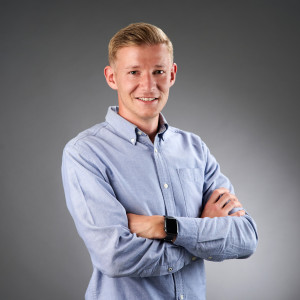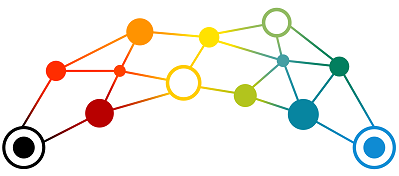
Welchen universitären Hintergrund haben Sie und wie haben Sie Ihren Weg in das StArfrica-Team gefunden?
Ich habe dieses Jahr meinen Master of Education in Biologie und Geographie abgeschlossen. In der Vergangenheit habe ich mehrfach mit universitären und außeruniversitären Einrichtungen zusammengearbeitet und hatte dadurch auch Kontakt zum ZIFET bzw. zum Gründungsbüro. In der Folge habe ich mich immer mehr mit diesem Themenfeld auseinandergesetzt und fortgebildet. Durch meinen intensiven Kontakt nach Ruanda bin ich dann über die Stellenausschreibung auf das Projekt aufmerksam geworden.
What is your academic background and how did you find your way into the StArfrica team?
I completed my Master of Education in Biology and Geography this year. In the past, I have worked with university and non-university institutions on several occasions and have had contact with ZIFET or the founding office. As a result, I have been increasingly involved in this field of study and have received further training. Through my intensive contact to Rwanda I became aware of the project through the job advertisement.
Seit wann sind Sie dabei, was sind Ihre Aufgaben und welche Erfahrungen bringen Sie mit?
Ich bin seit Anfang August dabei und werde mir erst einmal einen Überblick über das Projekt und seine Abläufe verschaffen und in mehreren Bereichen mitarbeiten, unter anderem im Bereich des E-Learning-Zertifikats und der Workshops. Gerade in diesem Bereich verfüge ich zudem über Kompetenzen, die sicherlich hilfreich sind. Vor zwei Jahren habe ich bereits an einem Projekt mitgearbeitet, was für mich der Einstieg ins Thema Entrepreneurship, Gründung und Startup war. Nachdem ich viele Veranstaltungen besucht und mich in verschiedenen Bereichen fortgebildet habe, war ich für das ZIFET als wissenschaftliche Hilfskraft im Projekt InnoFès tätig. Über meinen naturwissenschaftlichen Hintergrund sehe ich zudem wichtige Anknüpfungspunkte zur University of Rwanda, da dort etwa die Hälfte der Studierenden in MINT-Fächern studieren.
When did you join the project, what are your tasks and what experience do you bring with you?
I have been involved since the beginning of August and will first of all get an overview of the project and its processes and work in several areas, including the e-learning certificate and workshops. Especially in this area, I also have skills that are certainly helpful. Two years ago, I already worked on a project, which was my entry into the subject of entrepreneurship, founding and start-up. After attending many events and training in various areas, I worked for ZIFET as a research assistant in the InnoFès project. Through my scientific background I also see important links to the University of Rwanda, where about half of the students study STEM subjects.
Wie hat das Pilotvorhaben Ihr Interesse geweckt? Was ist Ihre Motivation, daran teilzuhaben?
Durch meine persönlichen Erfahrungen konnte ich Ruanda als ein hochinteressantes Land kennenlernen. Besonders spannend finde ich die Ausgangslage des Projektes, die einen Austausch und eine Zusammenarbeit auf Augenhöhe vorsieht. Gerade hierin sehe ich eine große Stärke des Projekts, das sich damit auch vom klassischen Gedanken der Entwicklungshilfe absetzt und die wirtschaftlichen Bedingungen, ausgehend von der Universität, stärkt. Dazu zählt auch der Austausch und die Sensibilisierung für ruandische Gründungsteams aus der Wissenschaft in Deutschland zu starten und für deutsche Startups und mittelständische Unternehmen in Ruanda bzw. in weiteren afrikanische Ländern ihre Ideen zu etablieren. Allgemein freue mich auch mit unserem motivierten StArfrica-Team neue Ideen umzusetzen und Gründer in ihrer Entwicklung zu unterstützen.
How did the pilot project arouse your interest? What is your motivation to take part in it?
Through my personal experiences I was able to get to know Rwanda as a highly interesting country. I find the starting point of the project particularly exciting, which provides for an exchange and cooperation at eye level. This is precisely where I see a great strength of the project, which thus also departs from the classic idea of development aid and strengthens the economic conditions, starting from the university. This also includes the exchange and sensitization of Rwandan start-up teams from the academic world to start up in Germany and for German start-ups and medium-sized companies to establish their ideas in Rwanda or in other African countries. In general, I am also looking forward to implement new ideas and support founders in their development with our motivated StArfrica team.
Was verbinden Sie mit Ruanda? Waren Sie schon einmal dort? Wenn ja, welche Erfahrungen haben Sie gemacht? Was hat Sie überrascht/erschreckt/begeistert? Falls nicht: Haben Sie vor, nach Ruanda zu reisen und wenn ja, was erhoffen Sie sich? Was zieht Sie an, was sind Ihre Erwartungen?
Die Kooperation der Universität mit Ruanda ist mir schon länger bekannt, vor allem durch mein Studium, da wir ja gerade im naturwissenschaftlichen Bereich viele Netzwerke haben und auch Forscher, die in Ruanda aktiv sind. So bin ich auf das Land aufmerksam geworden, habe mich im Studium damit auseinandergesetzt und bin über eine Studienreise der ESG zum ersten Mal nach Ruanda gekommen. Vor Ort haben wir viele Projekte besucht und beeindruckende Menschen kennengelernt. Daraus hat sich ein neues Sozialprojekt ergeben. Mit einer Gruppe von Studierenden unterstützen wir eine ruandische Menschenrechtlerin in Muhanga, die einen Kindergarten für Kinder inhaftierter Mütter bauen möchte. Dadurch sind mir natürlich die Schwierigkeiten und Probleme bekannt. Auf der anderen Seite stehen die wirtschaftliche Entwicklung in den letzten Jahren, eine Regierung, die enorm in Digitalisierung und Innovation investiert, die vielen Einrichtungen, die in diesem Bereich tätig sind und natürlich die politische Stabilität nach dem Genozid, die enorm wichtig ist für viele weitere Entwicklungen. Begeistert hat mich vor allem die Herzlichkeit und das Interesse der Menschen, aber beispielsweise auch die große Bereitschaft der Menschen zur Nutzung von digitalen Bezahldiensten oder spezifische Drohnenprojekte zum Transport von medizinischen Produkten. Generell hat Ruanda in den letzten Jahren eine tolle Entwicklung hingelegt. Es gibt viel Potenzial, viele kluge Köpfe und gute Ideen, die auch für unser Projekt interessant sein werden.
What do you associate with Rwanda? Have you ever been there? If so, what experiences have you had there? What surprised/frightened/enthused you? If not: Do you plan to travel to Rwanda and if so, what do you hope to achieve? What attracts you, what are your expectations?
I have been aware of the university’s cooperation with Rwanda for a long time, especially through my studies, since we have many networks in the natural sciences and also researchers who are active in Rwanda. That’s how I became aware of the country, dealt with it during my studies and came to Rwanda for the first time through a study trip by ESG. We visited many projects on site and met impressive people. This has even resulted in a new social project. Together with a group of students, we are supporting a Rwandan human rights activist in Muhanga who wants to build a kindergarten for children of imprisoned mothers. So of course I am aware of the difficulties and problems. On the other hand, there is the economic development in recent years, a government that is investing enormously in digitalization and innovation, the many institutions that are active in this field and, of course, the political stability after the genocide, which is enormously important for many further developments. I was particularly impressed by the warmth and interest shown by people, but also for instance by the great willingness of people to use digital payment services or specific drone projects for the transport of medical products. In general, Rwanda has made great progress in recent years. There is a lot of potential, many clever minds and good ideas that will also be interesting for our project.
Welchen Erfolg wünschen Sie sich für das Projekt StArfrica?
Ich bin überzeugt, dass wir mit den geplanten Aktivitäten sowohl in Deutschland als auch in Ruanda dazu beitragen können, dass viele neue Netzwerke und gute Ideen entstehen, die Startups gegenseitig für die Länder sensibilisiert und motiviert werden und, dass Existenzgründungen aus der Wissenschaft gelingen können. Es wäre auch schön, wenn Ruanda in dieser Hinsicht eine Vorreiterrolle für andere afrikanische Länder einnehmen kann und das Projekt ausgeweitet wird.
What success do you wish for the StArfrica project?
I am convinced that with the planned activities both in Germany and Rwanda we can contribute to the creation of many new networks and good ideas, that the start-ups are mutually sensitized and motivated for the countries and that start-ups from science can succeed. It would also be nice if Rwanda in this respect could take on a pioneering role for other African countries and if the project is expanded.
